Only a handful personalities are respected on both sides of Taiwan Straight, the most popular of which is Sun Yat Sen, the Father of Modern China. He is also considered the father of democratic China being the forerunner of the Chinese democratic revolution which eventually
led to the fall of Qing Dynasty, the last dynasty of China.
This also meant the end of 2,000 years of feudal system in the country. Born in Guandong and died in Beijing in 1925, his remains were transferred to Nanjing in 1929 where he was buried. A majestic mausoleum was erected in his honor at Zhong Mountain Scenic Area.
The area covers about 20 hectares in the East suburb of Nanjing.
To get here, you can
1. Take subway line 2 and get off Xiamafang Station.
2. Take the sightseeing vehicle to the site.
It takes around 5-10 minutes up the mountain. Tram fare is 5 RMB One-way.
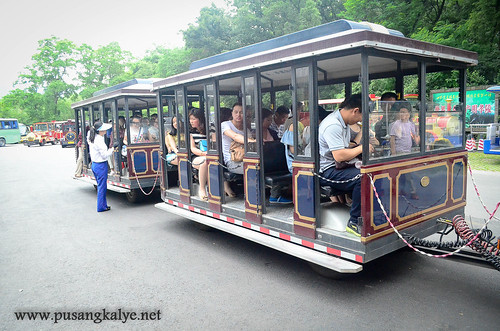
THE ARCHWAY
After the entrance is a wide open space where tour groups usually gather before they start going up the steps. This is where the first memorial archway is located. After the archway is a 480-meter passage adorned by pine trees on both sides. At the end of the passage is a Frontispiece standing around 16.5 meters high consistent with the design and blue roof of the archway.
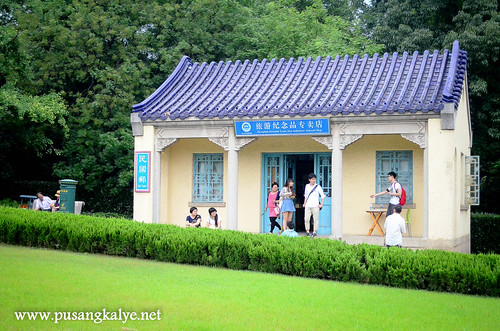
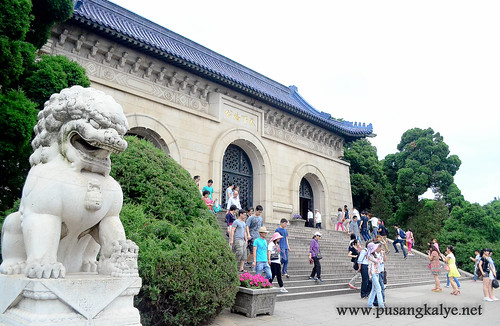
THE PAVILION
Through the frontispiece is a pavilion. It's either you go through it or around it to get to the next section.
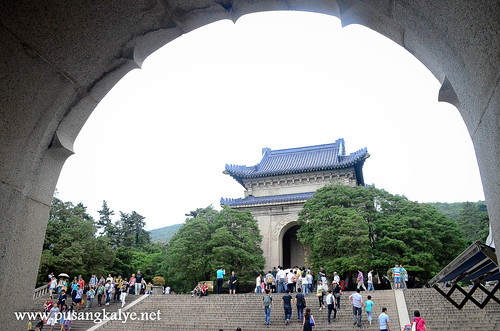
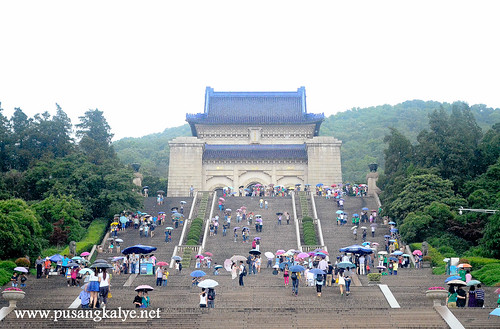
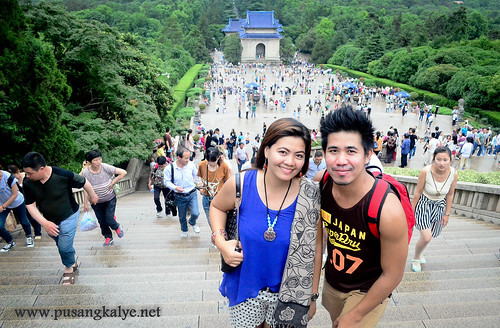
THE SACRIFICIAL HALL
We then queued to enter the Sacrificial Hall.
Inside is the 4.6-meter high stone statue of Sun Yat Sen at the center of the hall. Taking pictures is not allowed inside the hall and there are guards making sure that is implemented. I was able to snap a shot at the doorway though before I was finally reprimanded by one of the guards. Proper dress code is also observed. No sleeveless shirts and shorts allowed. Good thing I had a spare polo shirt with me that day.
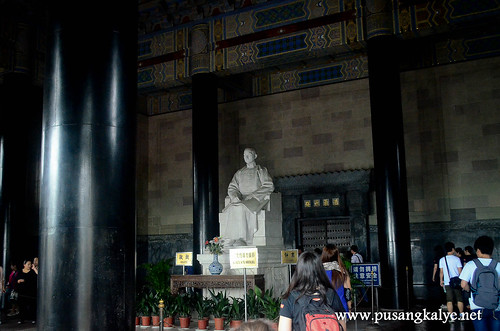
For everything that he stands for especially democracy, I have highest respect to Sun Yat Sen and being here is an overwhelming experience.
This also meant the end of 2,000 years of feudal system in the country. Born in Guandong and died in Beijing in 1925, his remains were transferred to Nanjing in 1929 where he was buried. A majestic mausoleum was erected in his honor at Zhong Mountain Scenic Area.
The 392 steps to SUN YAT SEN's MAUSOLEUM
HOW TO GET TO SUN YAT SEN MAUSOLEUM
To get here, you can
1. Take subway line 2 and get off Xiamafang Station.
2. Take the sightseeing vehicle to the site.
It takes around 5-10 minutes up the mountain. Tram fare is 5 RMB One-way.

From the bus stop
at the scenic area, you have to walk around 200 meters to the entrance
going through well maintained souvenir shops and food stalls.
THE ARCHWAY
After the entrance is a wide open space where tour groups usually gather before they start going up the steps. This is where the first memorial archway is located. After the archway is a 480-meter passage adorned by pine trees on both sides. At the end of the passage is a Frontispiece standing around 16.5 meters high consistent with the design and blue roof of the archway.

THE FRONTISPIECE
The Frontispiece
has three archways. Four Chinese characters are inscribed over the
doorway written by Dr. Sun Yat Sen which when translated in English
means " the world is a commonwealth".

THE PAVILION
Through the frontispiece is a pavilion. It's either you go through it or around it to get to the next section.
We stayed here for a while because the view from here
is a marvel. Standing at the center of the pavilion you come face
to face with the stairway leading to the Sacrificial Hall where Sun Yat
Sen's statue is erected. We were awed by the wide stairway leading to
the sacrificial hall and the sheer number of people climbing the steps
at any given time.

Taking a good photo less the photobombs could be an
effort. It took us a few minutes here until a sudden downpour stopped us
from advancing. We ran back to the frontispiece and waited for the rain
to die out before we proceed. Another opportunity to enjoy the view as
we were squeezed in a crowd of mostly locals.

392 STEPS UP
The 392 steps look easy at first but could prove tiring if you don't pace yourself. The trick is to occasionally pause for air and look back to enjoy the view below. It was sheer joy once we reached the base of the Sacrificial Hall. From here you can see the extent of the complex as well as the city from afar. The view is scenic indeed.
The 392 steps look easy at first but could prove tiring if you don't pace yourself. The trick is to occasionally pause for air and look back to enjoy the view below. It was sheer joy once we reached the base of the Sacrificial Hall. From here you can see the extent of the complex as well as the city from afar. The view is scenic indeed.

THE SACRIFICIAL HALL
We then queued to enter the Sacrificial Hall.
Inside is the 4.6-meter high stone statue of Sun Yat Sen at the center of the hall. Taking pictures is not allowed inside the hall and there are guards making sure that is implemented. I was able to snap a shot at the doorway though before I was finally reprimanded by one of the guards. Proper dress code is also observed. No sleeveless shirts and shorts allowed. Good thing I had a spare polo shirt with me that day.
It is important to note that the complex was erected by the
Koumintang Government. Thisnis the short lived democratic government
prior to their defeat by the communists forcing them to retreat to
Taiwan. I am surprised that despite what Sun Yat Sen and this mausoleum
stands for, (democratic ideals) the communist party didn't demolish the
whole place altogether. I noticed that that there are alterations inside
the sacrificial hall. Portions of writing on the walls are plastered
with cement so as to hide them. The interior therefore is rather a
monotonous space with nothing much to see but the statue of Sun Yat Sen
itself.

For everything that he stands for especially democracy, I have highest respect to Sun Yat Sen and being here is an overwhelming experience.
ENTRANCE FEE
Visit: http://www.zschina.org/
| Admission Fee: | Mausoleum
is free, including Fraternity Square, the Mausoleum Passage, Entrance
to the Mausoleum, the Stele Pavilion, the Sacrificial Hall and the
Burial Room; The Open-air Music Hall is CNY 10. The Linggu Scenic Area is CNY 35. Xiaoling Mausoleum of the Ming Dynasty is CNY 70. | |
| Opening Time: | 08:30-17:00; 10:00-17:00 on November 12 (the birthday of Dr. Sun Yat-sen); The Sacrificial Hall and the Burial Room are closed every Monday. | |
More on Najing Soon! ^^
______________________
______________________
YOU MIGHT ALSO WANNA READ:
>>Midnight Train from SHANGHAI-NANJING China and yes, the train officer screamed at.
>>#NANJING: Fuzimiao International Youth Hostel
>>WHAT TO EAT IN NANJING: Steamed Vegetable Ball, Fried Chinese Bolt, Deep Fried Candy Style Dumpling.
>> NANJING MASSACRE WAR MEMORIAL : For the 300,000 who perished
>>FUZIMIAO: Nanjing Confucius Temple Complex
>>NANJING MING CITY WALL and Xuanwu Lake
>>#NANJING: Fuzimiao International Youth Hostel
>>WHAT TO EAT IN NANJING: Steamed Vegetable Ball, Fried Chinese Bolt, Deep Fried Candy Style Dumpling.
>> NANJING MASSACRE WAR MEMORIAL : For the 300,000 who perished
>>FUZIMIAO: Nanjing Confucius Temple Complex
>>NANJING MING CITY WALL and Xuanwu Lake
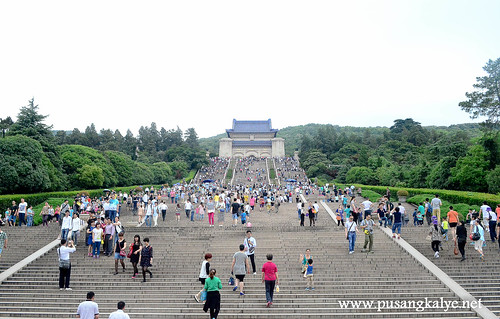
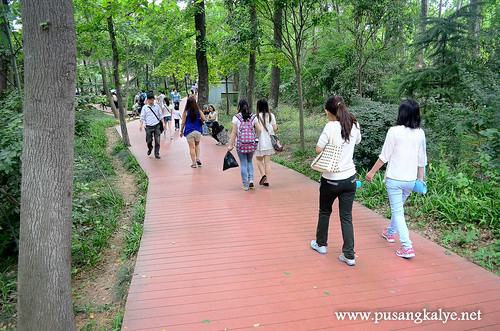
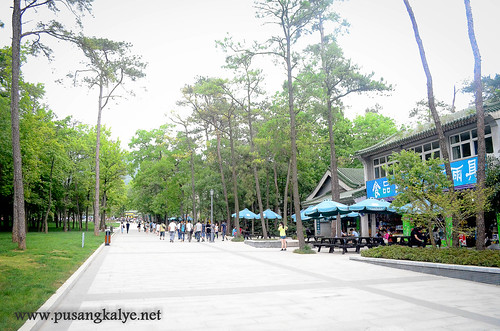
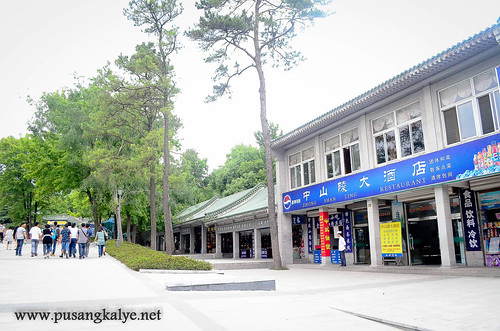
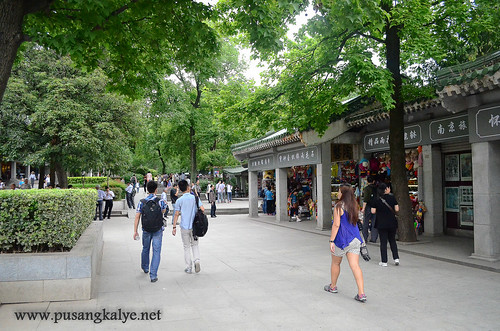
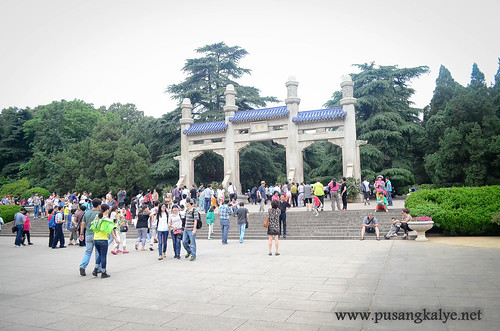
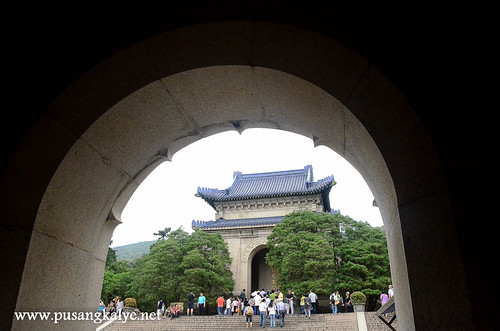
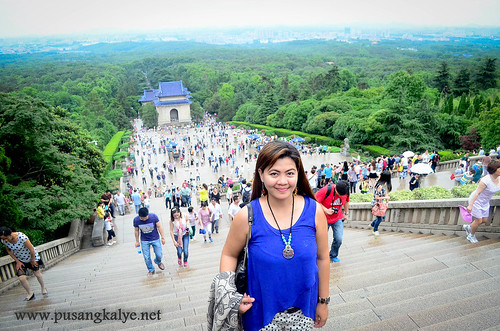
Comments
Post a Comment